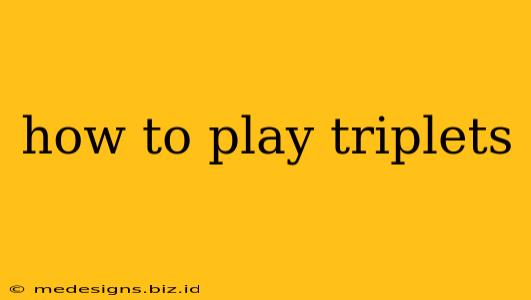Playing triplets can seem daunting at first, but with practice and the right technique, you'll be mastering them in no time. This guide breaks down everything you need to know about playing triplets, from the basics to advanced techniques. Whether you're a beginner or an experienced musician, you'll find valuable tips and tricks here to improve your triplet playing.
Understanding Triplets
Triplets are three notes played in the space of a single beat. They're a fundamental rhythmic element in music across various genres, adding rhythmic complexity and a syncopated feel. Understanding their rhythmic value is crucial before tackling their execution.
Identifying Triplets
Triplets are typically notated with a "3" written above or below the notes. This "3" indicates that the three notes within the triplet group should be evenly spaced within the time normally occupied by two notes of the same value. For example, a triplet of eighth notes takes up the same amount of time as a single beat (two regular eighth notes).
Common Types of Triplets
You'll encounter triplets in various note values:
- Eighth-note triplets: Three eighth notes played in the space of a quarter note beat. This is the most common type of triplet.
- Sixteenth-note triplets: Three sixteenth notes played in the space of an eighth note beat.
- Quarter-note triplets: Three quarter notes played in the space of a half note beat. Less common, but still important to understand.
Techniques for Playing Triplets
The key to playing clean and accurate triplets lies in evenness and consistent timing. Here are some techniques to help you achieve this:
Counting Triplets
Counting triplets accurately is essential. Instead of counting "1, 2, 3, 4...", try counting "tri-plet, tri-plet, tri-plet, tri-plet...". This emphasizes the grouping of three notes as a single rhythmic unit. You can also use a count of "1-and-a-2-and-a" for eighth note triplets. This helps internalize the subdivision of the beat.
Using a Metronome
A metronome is your best friend when practicing triplets. It provides a consistent tempo and helps you develop a solid sense of rhythm. Start slowly, focusing on the evenness of each note, and gradually increase the tempo as you improve.
Feeling the Pulse
Don't just focus on the individual notes; feel the underlying pulse of the music. This will help you maintain the rhythmic integrity of the triplets and avoid rushing or dragging. Practice subdivisions of the beat to get a feel for the underlying pulse.
Practice Exercises
Consistent practice is key. Start with simple exercises, gradually increasing complexity. Practice playing triplets in different contexts and musical styles. Here are a few exercises to get you started:
- Scales in triplets: Play major and minor scales using eighth-note triplets.
- Arpeggios in triplets: Play arpeggios using eighth-note and sixteenth-note triplets.
- Rhythmic patterns: Create your own rhythmic patterns incorporating triplets.
Advanced Triplet Techniques
Once you've mastered the basics, you can explore more advanced techniques:
- Syncopated triplets: Triplets that fall on off-beats can add a significant rhythmic punch to your playing.
- Tuplets: While triplets are the most common, tuplets (groups of four, five, or more notes) follow similar principles. Mastering triplets provides a strong foundation for playing all types of tuplets.
- Triplets across multiple voices: Playing triplets across multiple instrumental parts or voices requires meticulous coordination. Practice with a metronome and a focus on timing.
Troubleshooting Common Triplet Problems
- Uneven triplets: This is the most common issue. Slow down and focus on evenness. Use a metronome to check your timing.
- Rushing triplets: Consciously slow down your tempo. Focus on feeling the pulse and letting the music breathe.
- Dragging triplets: The opposite of rushing. Ensure you are not hesitating between notes and are moving smoothly from note to note.
By following these tips and practicing regularly, you'll significantly improve your ability to play triplets accurately and expressively. Remember, patience and persistence are key to mastering this important rhythmic skill. Good luck, and happy practicing!
